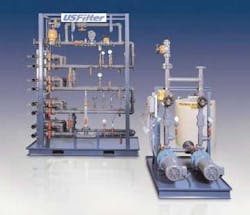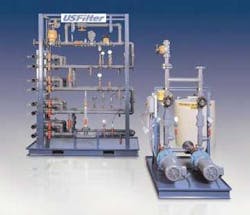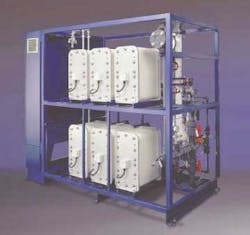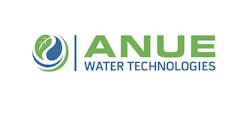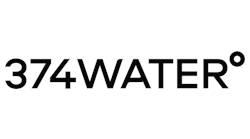By Alan G. Knapp
Microelectronic manufacturers are in an extremely competitive and fast-paced market with today's demanding environment. The cyclical nature of the industry shifted from expanding internal support infrastructure in the late 1990s to streamlining responsibilities and reducing staff to focus on core manufacturing in 2001. The result is a trend towards outsourcing water treatment and services in the microelectronics sector.
Water treatment service providers like USFilter provide ultra-pure water and wastewater solutions to microelectronics customers through outsourcing. Because water treatment is a service provider's core competency, the company can bring expertise to provide reliable, economical equipment processes to meet the needs of critical manufacturing in a semiconductor facility.
It is critical that the water service provider understands the industry needs and tailors treatment systems to the specific needs of each semiconductor manufacturer. A comprehensive design team should have experience in water and wastewater treatment. To implement the most appropriate technology and necessary treatment equipment, the team must be sensitive to costs, space constraints and water conservation requirements.
Water quality, quantity and safety are several of the expectations and benefits manufacturers cite for outsourcing their water treatment needs. Because of the sensitive nature and the impact to the manufacturing process, it is important for water treatment service providers to understand the nuances of the manufacturer's needs and become an integral part of the manufacturing team. Direct involvement with management and plant operations reduces the manufacturer's risk. And sound daily communication between the operating team and the customer through report-outs and data systems creates a strong customer/vendor team environment.
While meeting critical water quality and quantity specifications are one aspect of an operations contract, safety and compliance are equally important. The service provider should set and require its personnel to meet all regulations and guidelines, with zero tolerance for non-compliance. This is especially critical for those facilities that handle chemicals or hazardous materials. Supporting a safe and compliant environment is part of operating and maintaining systems in the most ethical, economical and reliable manner.
Finally before taking over water treatment operations for a manufacturer, the service provider must conduct a complete process analysis. The areas of focus include operator safety, where the entire system is evaluated by professional staff for any hazards. Failure Mode Effect Analysis (FMEA) is also performed to ensure that all equipment redundancy and reliability have been reviewed to ensure uptime requirements are met. Technologies are evaluated for best quality results with minimal impact to the environment at the best possible cost. This type of evaluation allows the service provider to offer a comprehensive evaluation and recommendations to the manufacturer.
Case Study
With a factory requirement for lower costs, improved quality and higher volume demand, a West Coast microelectronics manufacturer challenged USFilter to improve operations and maintenance for ultra-pure water and waste treatment systems while reducing costs.
Process design teams evaluated the manufacturer's water treatment systems and requirements. One recommendation was the use of microelectronics-grade ion exchange resin for improved final water quality at an economical price, including service to the manufacturer for the ongoing change-out of the resin.
The manufacturer reduced its energy costs. USFilter site operations, along with engineering, worked with the manufacturer's engineering staff to determine numerous pumps were operating at low efficiency.
Finally, a simple pipe modification allowed high-quality rinse water to be recovered for reuse, reducing the demand on make-up water requirements.
Overall operating costs at the facility have been reduced with minimal capital expenditure while improving reliability without impacting production.
Non-core system operational issues led this semiconductor facility to look at outsourcing its water and waste treatment to increase system reliability and capacity within the existing system.
By outsourcing the treatment equipment, USFilter was able to make recommendations for system upgrades and expansions by working directly with the manufacturer, utilizing experience, expertise and design tools at hand.
In addition to the system upgrade recommendations, a FMEA was performed to ensure close scrutiny of the system design and operation. Downtime is not an option in the microelectronics industry. Even when a simple media change-out is required, the selection of media is reviewed and selected based on reliability and rinse uptime, so production is not impacted.
The trust forged with this manufacturer resulted in a system with greater reliability and capacity. This comfort level and confidence assures the manufacturer that it will receive the same level of support in the event of any operational issues, system enhancements or process changes.
Conclusion
Ultimately, manufacturers look to continuously exceed expectations in quality, reliability and safety in all aspects of the services provided. Communication with operational status, "good or bad," is the key to success as is a strong relationship with an operations provider.
About the Author
Alan G. Knapp is vice president and strategic account manager for the microelectronics industry at USFilter. Based in Portland, OR, Napp joined USFilter more than three years ago. He has more than 18 years of water treatment industry experience, the majority of which has been focused on the microelectronics industry. A graduate of Conestoga College in Kitchener, Ontario, Alan is a mechanical engineering technician.
